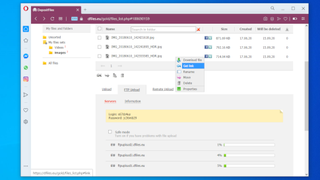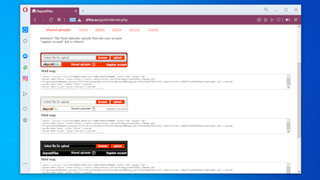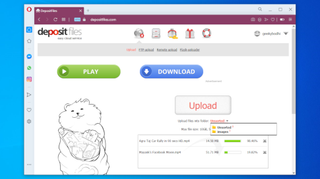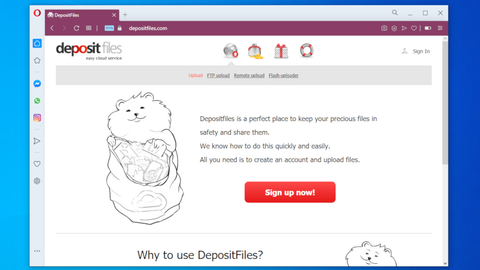TechRadar Verdict
An odd service that has an awkward mix of upload and download features, which renders it virtually useless for any genuine use.
Pros
- +
Unlimited storage
- +
FTP and remote uploads
- +
Shared uploader
Cons
- -
Unintuitive interface
- -
No mobile app
- -
No encryption
- -
No private files
- -
No file previews
- -
No file descriptors
- -
No long-term file retention
Why you can trust TechRadar
If you look at DepositFiles purely from a standpoint of features, it appears like a regular online storage and file sharing website. It’s got bottomless storage, and the standard upload and file management and sharing options. But there’s more to a file storage and sharing service than just a set of features, and DepositFiles is a prime example.
Features
Like we’ve just mentioned, DepositFiles offers the standard gamut of features, the biggest of course being its no-limit storage. You can upload as many files as you want for as long as possible. Even its per-file limit of 10 GB is pretty generous.
As far as upload conveniences are concerned, again the service doesn’t disappoint. In addition to the web interface, you can transfer content into your DepositFiles account via FTP clients. Furthermore, the service also supports Remote Uploads via direct links. You can even use FTP links with authentication information to transfer files hosted elsewhere into your DepositFiles account.
Unlike many services, DepositFiles also offers a Shared Uploader flash app, which is a snippet of code that you can add to your website or blog. Any file uploaded using this flash uploader will automatically pop in your DepositFiles account inside a special folder named Filebox. This is a good option for soliciting files from a trusted group of individuals like a class or a project group.
In terms of security, while the service doesn’t offer end-to-end encryption, it does allow you to lock access to them with a password. Finally, the service also offers a cross-platform desktop app that you can use to upload and manage files on your DepositFiles account. It can even function as a download manager.
You may also want to consider 4Shared

Interface and apps
The problem with the service however is its archaic and uninspiring interface. Also many of its features haven’t been exposed properly through Despositfile’s graphical interface.
To get started you can either register manually with the service or use single-sign on logins from Facebook, Twitter and Google. Post registration you can use the web interface to either drag-and-drop files or use the file manager to upload files into your account. Unlike many of its peers that upload multiple files sequentially, DepositFiles uploads all at once, thus maximizing the available bandwidth.
However, in contrast to most of the popular services, you don’t get any option to add a description or tags to the uploads either while uploading them nor after they appear in your account. All files are automatically shared once uploaded. But you have to mouseover the OK button to reveal the shared URL, which is a usability faux pas in our opinion.
Similarly, some of the other useful functions are also masked by the unintuitive interface. For instance, all uploaded files by default end up in the Unsorted folder, which isn’t actually a folder. That’s because DepositFiles enables you to create a sharing link for a folder, which allows you to share all its contents with ease. However you can’t create this link for the Unsorted folder.
There are several other hidden features of the interface that aren’t very apparent, such as the global search and the ability to group selected files into a new folder. The lack of documentation further adds to the woes of the unhelpful interface.

Plans and Pricing
DepositFiles is one of the few services that allows unregistered users. We don’t look favorably towards such services since they tend to encourage illegal file sharing. Surprisingly, DepositFiles doesn’t enforce too many penalties on unregistered users. Not only do they get an unlimited amount of storage space, they can also upload single files upto 10 GB in size just like paid users.
Unregistered users don’t get the ability to manage their uploads since they obviously don’t have an account to log into. So while they can’t categorize their files into folders or rename them, they can delete them. That’s because whenever a user uploads a file, in addition to the sharing link, the service also generates a unique link to delete a file. Using this link, unregistered users can remove their uploads.
Registering with the service adds a few conveniences to help manage the uploaded files. Furthermore, registered users can also use assistive features like FTP and Remote uploads. The real restrictions comes when downloading shared files. Non paying Free users have to go through a wait period and they can’t download more than 5 GB of files a day.
Of course these restrictions don’t apply to the paying Gold users. They can download multiple files simultaneously and get a daily quota of 20 GB worth of downloads. Gold memberships cost $11.95/month, but get cheaper if subscribed for a longer duration. For instance it’ll cost $19.95 for 2 months, $44.95 for 6 months and $74.95 for a year.

One thing to note however, is that the service tends to equip its Gold users with more download abilities as compared to upload advantages. For instance, Gold users get download priority and can resume interrupted downloads, while their upload features are no different from the non-paying Free users.
A big red flag for us is the lack of support for creating direct links. Even Gold users don’t get this ability. What they do get is the ability to download files instantly without waiting.
Then there’s the service’s file deletion policy. DepositFiles will remove files that haven’t been downloaded for the last 90 days, even for Gold users. While it’s true that after each file download the retention period is extended for another 90 days, the mere existence of the policy even for Gold users points to the fact that the service doesn't care much for long-term storage.
Final Verdict
As we’ve seen throughout the review, DepositFiles seems to be unfavorably biased towards downloaders. This is underlined by the fact that it offers the same upload conveniences to its Free and Gold members. In fact, the service only advertises its download conveniences on its subscription page.
That in itself might not be a deal breaker for us. However its lack of useful upload options, such as direct links, is. Coupled with its forced deletion policy, there are very little use cases we can find for DepositFiles .
- We've featured the best cloud document storage.
With almost two decades of writing and reporting on Linux, Mayank Sharma would like everyone to think he’s TechRadar Pro’s expert on the topic. Of course, he’s just as interested in other computing topics, particularly cybersecurity, cloud, containers, and coding.


